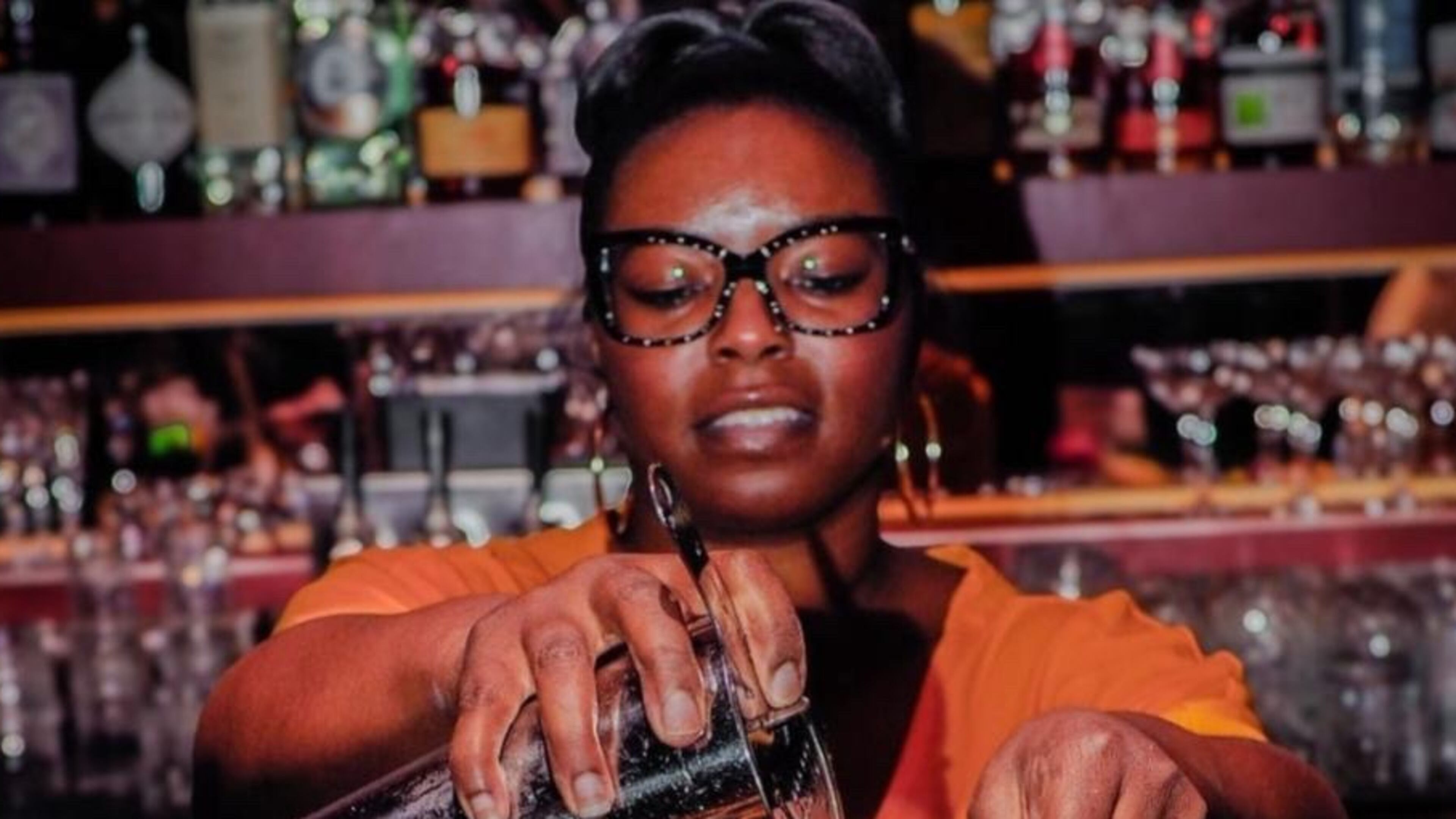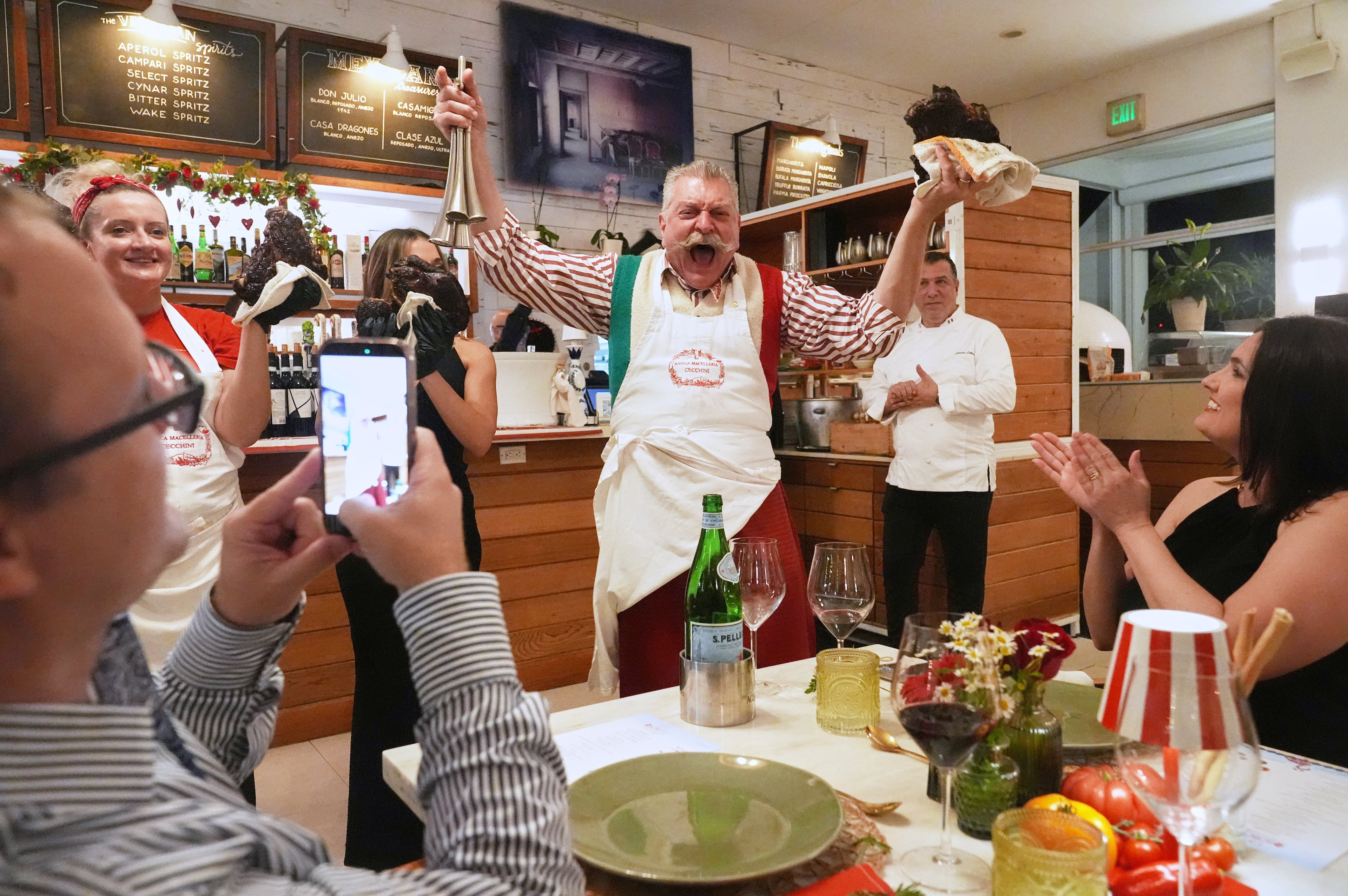Cocktail stirs controversy at Atlanta bar pop-up

Atlantan Kia Palmer’s latest cocktail creation became an online conversation before it could hit the menu for local pop-up Girl Bar, operated by an all-female team of bartenders.
Palmer said she wanted to give attendees of the Sept. 1 event at Banshee in East Atlanta “a little taste of cookout culture” with a cocktail. She came up with the idea to go along with the theme “Fruits of Our Labor Day.”
However, the cookout cocktail won’t be part of the pop-up, Girl Bar founder Haley Herebia said, because “one of our coworkers, who is Black, approached us and was offended by the ingredients of the cocktail, even though it was made by a Black person.
Palmer, who has tended bar at such Atlanta restaurants as Parish, the Optimist and the Painted Pin and currently splits time between the Atlanta Botanical Garden and downtown’s Bottle Rocket, said she was trying to touch all the bases of a Black cookout with her drink. “It tastes like a cookout,” she said, “and includes four things you would definitely see at a cookout — fried chicken, watermelon, cognac and Kool-Aid.”
Adrian Miller, known as the Soul Food Scholar, is the author of “Soul Food: The Surprising Story of an American Cuisine, One Plate at a Time.”
In an email to The Atlanta Journal-Constitution, he said certain ingredients, including fried chicken and watermelon, “are stigmatized as racist when any endeavor is associated with African Americans.”
He explained that the stigma comes from the culture war against Blacks that racist whites waged after the Civil War. Primarily through media images, literature and music, “Blacks were reduced to being like children or beasts easily satisfied by these foods rather than economic opportunities, political and social equality,” he said. “At the same time, Blacks were being terrorized by racist whites for simply living and trying to exercise their rights.”
A drink rooted in history
“I think of watermelon in the summertime,” Palmer said, “and I loved watching my grandaddy, with his big knife, cutting it, and sitting on the back porch spitting seeds out together — that moment with my guy, the best guy.”
But then racist tropes about Black people and watermelons began circulating. As Palmer sees it, “When it turned out that watermelon was delicious and these former indentured servants were making money and becoming financially independent, then it became a problem.”
Watermelon is used three ways in her cocktail: The summertime flavor of the juice infuses the drink, 18.21 Bitters’ watermelon mint shrub adds a layer of depth and acidic complexity, and a melon ball is used as a tasty garnish.
The cognac used in the drink also is embedded in Black culture, said Palmer, who remembers her uncles sipping it at celebratory cookouts of her youth. “When Black soldiers were fighting for the U.S. during World War I and II, they fell in love with cognac,” she said. “It’s softer than whiskey or bourbon.” They brought the spirit home and, like other traditions, passed it down. Palmer uses a split of Hennessy and Hine VSOP cognac in her drink.
As for fried chicken, Palmer said that was what she ate during Sunday dinner or at family cookouts. Before dining cars were added to trains, Black women cooked and boxed fried chicken and sold it through train windows. And, much like watermelon, fried chicken eventually took on racial connotations with some people.
Palmer uses chicken grease in her drink, using a technique called fat washing. It’s an emulsification of the spirit where a fat (butter, olive oil, animal) is added to the alcohol and set in the freezer. As solids rise to the top, they are scraped away, leaving flavor “and a good mouthfeel,” she said.
Kool-Aid, meanwhile, was a favorite drink of Palmer’s when she was a child. Its predecessor in Black culture was the red drink, a traditional beverage that has roots in West Africa and is associated with celebrations such as Juneteenth and Christmas.
In his book, Miller, explains that “red drink is not just a color, it’s also a flavor.” The hibiscus flower was transported from West Africa with enslaved people and was made into drinks by them.
In her cookout cocktail, Palmer also rims the glass with tangy lemon pepper. The chicken flavor adds a savory element and there is sweetness from honey and cognac. The drink finishes juicy and smooth.
Cocktail controversy
In an Aug. 16 post on Instagram, Palmer addressed the controversy surrounding her drink, saying she was asked by the founders of Girl Bar to be one of two guest bartenders for the Sept. 1 pop-up, but “because someone decided that my cocktail was racist, somehow, in its celebration of the cookout ... I have been asked not to present the cocktail that I have spent a lot of time and energy and money researching and creating.”
(Although Palmer included a fried chicken wing as a garnish to the drink in a Girl Bar promotional photo that ran with her Instagram post, she said it is not served that way.)
In a comment on the post, Herebia said she never saw anything wrong with the cocktail until the coworker complained, and “I didn’t know how to navigate that. I should have done what Kia has done here, which is start a dialogue. I should have communicated with her more.”
Herebia added that when she started Girl Bar, her intention “was to uplift women and allow them to explore their creativity. I’m sorry if I failed Kia in any way. She is my friend and I love her.”
In an Instagram message to The Atlanta Journal-Constitution, Herebia added: “This was such a difficult situation to navigate. I’m a brand new business owner, I’m trying to transition from bartender to owner and there is so much I have to learn in that process.”
Well-known Atlanta mixologist Tiffanie Barriere said in an email to the AJC that each ingredient in the cookout cocktail “was chosen with intention, reflecting elements that are not just food or drink but symbols of our shared history and identity. ... Pulling the cocktail due to complaints feels like erasing a part of our culture under the guise of political correctness. While I understand the need for sensitivity, I also believe in the importance of representing our experiences authentically and proudly.”
Miller added that he’s not surprised that the cocktail inspired conflicting emotions.
“There’s a lot of pain associated with that time period,” he said. “Despite good intentions, any linking of Black people to fried chicken and watermelon is going to produce a very strong reaction. This unfortunate episode shows the importance laying bare this ugly history and reclaiming these foods for rightful celebration.”
In spite of the controversy, Palmer said that she planned to be in attendance at the event, in support of Girl Bar.
Although the cookout cocktail won’t be featured by Girl Bar, two other pop-ups, Duo Lingo and Bodega Bar, and Westside Motor Lounge have expressed interest in featuring Palmer and her drink, and it will be offered at a private event with 18.21 Bitters.
Palmer said she is proud of the concoction and the tale it tells. It also touches on the challenges of Black identity, she said. “If I was Caribbean and leaning into those flavors, it wouldn’t be racist, right? But leaning into my regular Black culture is problematic, and that’s not OK.”
She said she will post future opportunities for the public to try her drink on her Instagram account, @theonomatokia.


